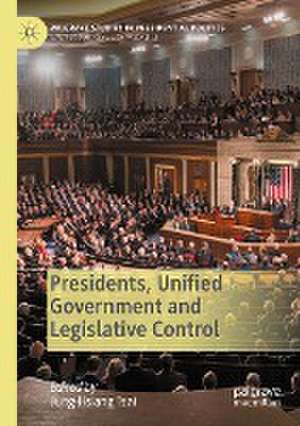Presidents, Unified Government and Legislative Control: Palgrave Studies in Presidential Politics
Editat de Jung-Hsiang Tsaien Limba Engleză Paperback – 30 iun 2022
| Toate formatele și edițiile | Preț | Express |
|---|---|---|
| Paperback (1) | 720.70 lei 6-8 săpt. | |
| Springer International Publishing – 30 iun 2022 | 720.70 lei 6-8 săpt. | |
| Hardback (1) | 724.80 lei 6-8 săpt. | |
| Springer International Publishing – 29 iun 2021 | 724.80 lei 6-8 săpt. |
Preț: 720.70 lei
Preț vechi: 878.90 lei
-18% Nou
Puncte Express: 1081
Preț estimativ în valută:
137.91€ • 144.35$ • 114.78£
137.91€ • 144.35$ • 114.78£
Carte tipărită la comandă
Livrare economică 31 martie-14 aprilie
Preluare comenzi: 021 569.72.76
Specificații
ISBN-13: 9783030675271
ISBN-10: 3030675270
Ilustrații: XV, 181 p. 2 illus.
Dimensiuni: 148 x 210 mm
Greutate: 0.25 kg
Ediția:1st ed. 2021
Editura: Springer International Publishing
Colecția Palgrave Macmillan
Seria Palgrave Studies in Presidential Politics
Locul publicării:Cham, Switzerland
ISBN-10: 3030675270
Ilustrații: XV, 181 p. 2 illus.
Dimensiuni: 148 x 210 mm
Greutate: 0.25 kg
Ediția:1st ed. 2021
Editura: Springer International Publishing
Colecția Palgrave Macmillan
Seria Palgrave Studies in Presidential Politics
Locul publicării:Cham, Switzerland
Cuprins
1. Introduction: Presidents, Unified Government and Legislative Control.- 2. A Gently Slopped Leadership: Parliamentary Support for Presidents in France.- 3. Power Scope and Party Disunity of Semi-Presidentialism in Taiwan: The Perspective of Political Participation of Elites and the Masses.- 4. President and Congress in the Period of Unified Government in America.- 5. Political Institutions, Democratization, and Incumbent Party Cohesion under Unified Governments in Mexico.- 6. Consensual Decision-Making and No Rebels: Presidentialism in Indonesia.- 7. Presidents, Unified Government and Legislative Control: What Have We Learned?.
Notă biografică
Jung-Hsiang Tsai is Professor of Political Science at the National Chung Cheng University, Taiwan. He earned his PhD in Political Science from Boston University, USA. His research interests include comparative semi-presidential studies, comparative presidential studies, Sino-US relationships, and qualitative political methods. His works have been published in Crime, Law, and Social Change, French Politics, and Democratization.
Textul de pe ultima copertă
This book aims to explain why some presidents are more successful than others in winning the support of legislators during periods of unified government. This book covers five presidential and semi-presidential systems such as France, Indonesia, Mexico, Taiwan, and the U.S. with a wide variety of institutional arrangements and political dynamics. This book elaborates on explaining how institutional factors such as confidence vote, electoral system, candidate nomination and presidential unilateral power influence the ability of presidents to pass their legislative agendas through comparisons across presidential and semi-presidential systems.
Jung-Hsiang Tsai is Professor of Political Science at National Chung Cheng University, Taiwan
Caracteristici
Presents a unique contribution to our understanding on why some presidents are more successful in winning legislators' support than others. Explains how institutional factors such as confidence vote, electoral system, candidate nomination and presidential unilateral power influence the ability of presidents to pass their legislative agendas through comparisons across presidential and semi-presidential systems. Covers five presidential and semi-presidential systems such as France, Indonesia, Mexico, Taiwan, and U.S. with a wide variety of institutional arrangements and political dynamics






